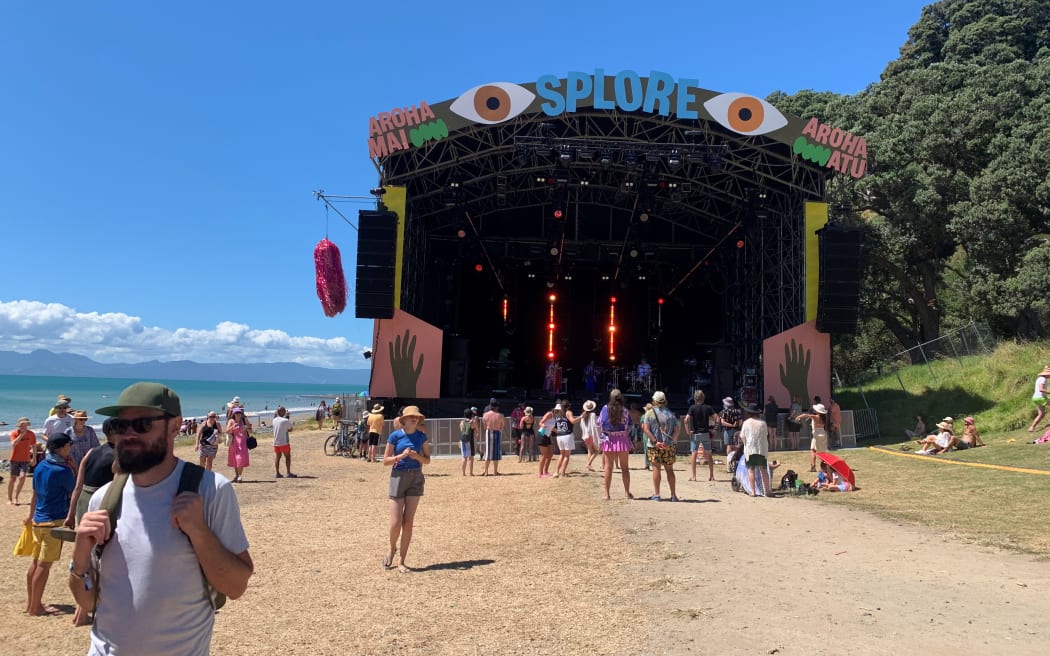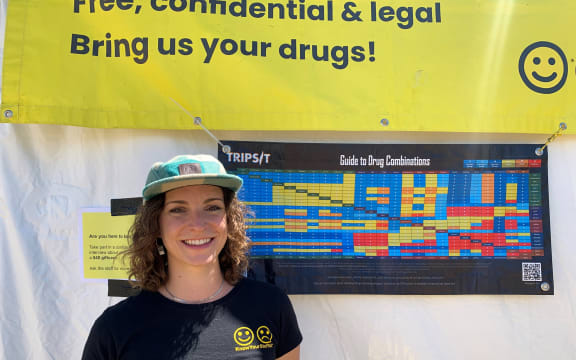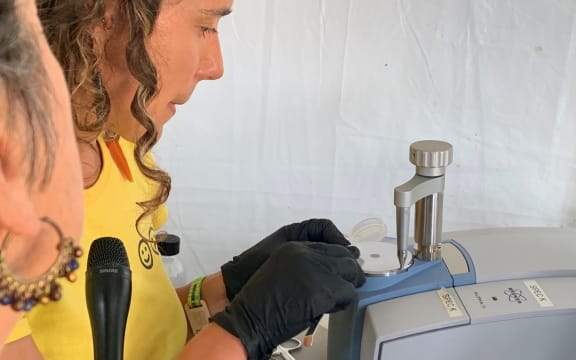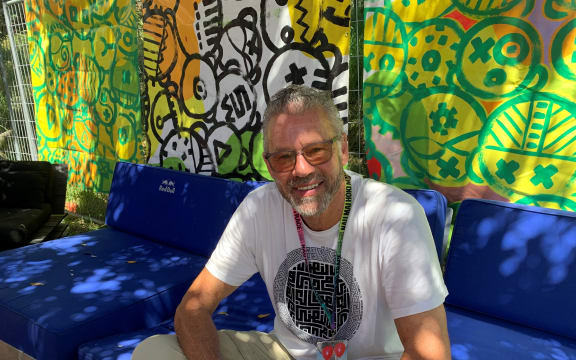The Detail goes inside a drug-checking tent at a music festival, where drug testers say 10 percent of drugs could be dodgy.

Splore main stage Photo: Leah Hollingworth
Every weekend 80,000 doses of the illegal party drug MDMA are taken around New Zealand.
That's the number Casey Spearin, manager of the drug-checking programme KnowYourStuff, quotes from police wastewater testing data.
"That's just MDMA, that's not including all the other things that people take," she says.
It is her response to critics of drug-testing, who say that it normalises and even encourages illicit drug use.
"It's already normalised. What's not normalised is talking about it out in the open. And that's really what we're doing, we check drugs but we sit people down, we have a conversation with them: 'this is what you've got, what are you doing to keep yourself safe, how do you look after your friends'," she says.
"And we're just consistently hearing from people this is the first time I've had an honest conversation with someone about drugs."

KnowYourStuff manager Casey Spearin Photo: Leah Hollingworth
Those conversations have been going on all summer at music festivals and orientation weeks at universities, and they are all out in the open because in 2020 New Zealand became the first country in the world to legalise checking of illicit substances by licensed organisations such as KnowYourStuff.
The drug checking hasn't stopped new, potentially dangerous synthetics popping up on the market - in recent weeks university students celebrating orientation week or O week are being warned of a potentially dangerous synthetic that is being sold as MDMA.
"We have been seeing a number of harmful things this summer," says Spearin. "Synthetic cathinones are often sold as MDMA and we're seeing those pop up, there's been a lot coming up in Dunedin this week over O week. Up to half of MDMA that we got through our drug checking clinics was not, it was cathinones," says Spearin.
Cathinones, sometimes called bath salts, are a group of laboratory-made stimulants that mimic the effects of the khat plant but the effects of one dose are much stronger than MDMA.
"We've detected one or two brand new types of cathinones in the last few days in Dunedin and that really shows that we're just going to continue to play whack a mole with all of these chemicals that can hit the market with zero quality control," she says.
Spearin says the amount of drugs that come to services like KnowYourStuff make up 0.1 percent of the total drug market, but there are signs that the number of dodgy substances are falling. Nine out of 10 of the doses are what they claim to be but that still means 10 percent contain a substance that could be dangerous, even deadly, she says.
"If you went to a bar and there's a one out of 10 chance that your wine is methanol, you'd be pretty upset about that," she says.
The Detail is with Spearin in the KnowYourStuff tent at Splore music festival in Auckland as drug users or "clients" queue to have their drugs checked. In the past three years since it was legalised, the publicly funded service that is run mostly by volunteers says it has tested more than 11,000 samples at more than 120 events and found more than 2100 dangerous substances pretending to be something else.
At a small table inside the tent, the client watches as a matchhead-sized sample of their drug goes into a small plastic bag inside a numbered envelope.

Inside the drug checking tent with Jax Brown Photo: Leah Hollingworth
"Sometimes people come to us and they say, I tried this yesterday, I had a really bad time on it, something was weird, I don't like it," a KnowYourStuff worker tells The Detail. "We test it and if it's something they're not expecting, that might mean they don't do it again tonight.
"People want to have a good time, no one's taking drugs to have a bad time."
The client stays anonymous but information about what they know about the drug, the colour of the substance, whether it is a pill or crystal or in another form are recorded. LSD is usually tested in front of the client with reagent while other substances are sent to another part of the tent to be put under an infrared spectrometer.
Clients find out in 30 minutes what their substance is and whether it contains anything more than the drug they were sold.
"We never say its all good no worries. No drug use is completely safe," KnowYourStuff Wellington manager Jax Brown says. "It's not a measure of purity, strength, quality, anything like that. All the spectrometer can do is say, is it this substance or isn't it."
Splore director John Minty tells The Detail that the festival has a no drug policy and people are searched for drugs and alcohol when they come on site.

John Minty, Splore director Photo: Leah Hollingworth
"But we're basically looking for people with large quantities, people who may be dealing. Those are the people we refer onto the police. We don't search through women's purses looking for a joint or something like that, we feel that's too invasive," Minty says.
He is adamant that legal drug checking does not encourage drug use.
"It's totally the opposite. If you go to any festival anywhere in the world, going back millennia people were taking psychedelics. It's a matter of life, you can't ban drugs.
"In Australia they've got drug dogs at the festival entrance, and they've lost so many kids because they're loading up on their drugs before they go into the festival and that is the reality of enforcing drug free policing."
Check out how to listen to and follow The Detail here.
You can also stay up-to-date by liking us on Facebook or following us on Twitter.


